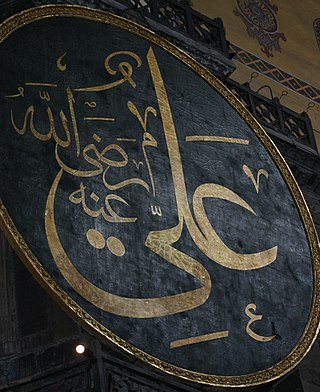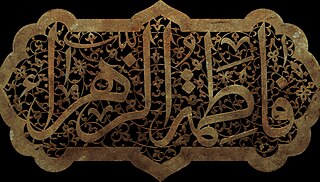
Abd Allah ibn Abi Quhafa, commonly known by the kunyaAbu Bakr, was the first caliph, ruling from 632 until his death in 634. A close companion and father-in-law of Muhammad, Abu Bakr is referred to with the honorific title al-Ṣiddīq by Sunni Muslims.

Uthman ibn Affan was the third caliph, ruling from 644 until his assassination in 656. Uthman, a second cousin, son-in-law, and notable companion of the Islamic Prophet Muhammad, played a major role in early Islamic history. During his reign as caliph, he was known for ordering the official compilation of the standardized version of the Quran that is still being used today.

Ali ibn Abi Talib was the cousin and son-in-law of the Islamic prophet Muhammad, and was the fourth Rashidun caliph who ruled from 656 CE to 661, as well as the first Shia imam. Born to Abu Talib ibn Abd al-Muttalib and Fatima bint Asad, young Ali was raised by his elder cousin Muhammad and was among the first to accept his teachings.

The Rashidun are the first four caliphs who led the Muslim community following the death of Muhammad: Abu Bakr, Umar, Uthman, and Ali.
The Saqifa of the Banu Sa'ida clan refers to the location of an event in early Islam where some of the companions of the Islamic prophet Muhammad pledged their allegiance to Abu Bakr as the first caliph and successor to Muhammad shortly after his death in 11 AH. The Saqifa meeting is among the most controversial events in early Islam, due to the exclusion of a large number of Muhammad's companions, including his immediate family and notably Ali, his cousin and son-in-law. The conflicts that arose soon after Muhammad's death are considered to be the main cause of the current division among Muslims. Those who accepted Abu Bakr's caliphate were later labeled Sunnis, while the supporters of Ali's right to caliphate were later labeled Shia.

The Election of Uthman refers to the appointment of Uthman ibn Affan as the third caliph by a committee, which was assembled by the dying caliph Umar in 23 AH. The committee likely consisted of six early Muslims from the Quraysh tribe, including the prophet Muhammad's second cousin and son-in-law Uthman and Muhammad's first cousin and son-in-law Ali ibn Abi Talib. The deciding vote was given to Uthman's brother-in-law Abd al-Rahman ibn Awf, who appointed the former as the next caliph after the deliberations stalled. The choice of the wealthy Uthman is often explained as intended to guard the interests of the Quraysh and to follow the practices of the first two caliphs, namely, Abu Bakr and Umar. The committee has been criticized for its bias towards Uthman and for its exclusion of the Ansar.
Fadak was a village with fertile land in an oasis near Medina. The takeover of Fadak by Muslims in 629 CE was peaceful and a share of it thus belonged to the Islamic prophet Muhammad. After Muhammad died in 632, Fadak was confiscated from his daughter Fatima and administered as public property, despite her objections. Fadak later changed hands many times as a fief.

Muhammad ibn Abi Bakr ibn Abi Quhafa al-Taymi was an Arab Muslim commander in the service of the fourth Rashidun caliph and first Shia Imam, Ali ibn Abi Talib. Muhammad was the youngest son of the first Rashidun caliph Abu Bakr and Asma bint Umays. He had his son, Al-Qasim taught by his aunt, Aisha, and by Ibn Abbas. Which is why many Hadiths are quoted through Muhammad and his son and thus were the source of much of the information of Islam and narrations available today.

Banū Taym was a clan of the Quraysh tribe of Mecca. The first caliph, Abu Bakr, hailed from the Banu Taym, as did another prominent companion of Muhammad, Talha ibn Ubaydallah.

Ali ibn Abi Talib was the cousin and son-in-law of the Islamic prophet Muhammad. Ali contributed significantly to Islam in its early years and was likely the first male to accept the teachings of Muhammad. In Sunni Islam, Ali is recognized as a close companion, a foremost authority on the Quran and Islamic law, and the fountainhead of wisdom in Sunni spirituality. When Muhammad died in 632 CE, Ali had his own claims to leadership, perhaps in reference to Muhammad's announcement at the Ghadir Khumm, but he eventually accepted the temporal rule of the first three caliphs in the interest of Muslim unity. During this period, Ali is portrayed in Sunni sources as a trusted advisor of the first three caliphs, while their conflicts with Ali are neutralized or downplayed. Ali himself succeeded to the caliphate in 656 but his rule was immediately challenged by multiple pretenders and he was assassinated in 661.

The Shaqshiqiyya Sermon is a controversial text in Nahj al-balagha, the best-known collection of sermons, letters, and sayings attributed to Ali ibn Abi Talib, who was the fourth Rashidun caliph, the first Shia imam, and the cousin and son-in-law of the Islamic prophet Muhammad. The sermon is highly critical of the predecessors of Ali, namely, Abu Bakr, Umar, and Uthman, accusing them of usurping the right of Ali to the caliphate.

Hadith of Muhammad's inheritance refers to a statement attributed to the Islamic prophet Muhammad, in which he reportedly disinherited his family, leaving to his successor as a charitable endowment his properties, including a valuable share of the agricultural lands of Fadak near Medina. In Sunni sources, this hadith is narrated primarily on the authority of the first caliph, Abu Bakr, who is said to have cited it to reject the claims of Muhammad's daughter Fatima to Fadak. In contrast, the authenticity of the hadith of inheritance is rejected in Shia Islam. Rather than a financial dispute, the saga of Fadak is largely viewed as a political conflict over the succession to Muhammad between Abu Bakr and Ali. The latter was Muhammad's cousin and Fatima's husband.

The ban on Hadith is a historical tradition, which says that Umar, the second Caliph of the Rashidun Caliphate ordered a ban on the writing down of oral traditions about the Islamic Prophet Muhammad, who died in 632 CE. Although the tradition is prominently quoted and referred to, it was not given any formal name, in contrast to other Hadiths such as the Hadith of the pond of Khumm or the Hadith of Qur'an and Sunnah.

The Rashidun Caliphate consisted of the first four successive caliphs (lit. 'successors') who led the Muslim community following the death of the Islamic prophet Muhammad in 632 – Abu Bakr, Umar, Uthman, and Ali. It ended with the death of Ali and the establishment of the Umayyad Caliphate in 661 by Mu'awiya ibn Abu Sufyan. During the Caliphate's existence, the empire was the most powerful economic, cultural, and military force in West Asia and Northeast Africa. In Sunni Islam, the caliphate is considered to have been 'rightly guided', meaning that it constitutes a model to be followed and emulated from a religious point of view. The caliphs are also known in Muslim history as the "orthodox" or "patriarchal" caliphs.
Shi‘a Islam, also known as Shi‘ite Islam or Shia, is the second largest branch of Islam after Sunni Islam. Shias adhere to the teachings of Muhammad and the religious guidance of his family or his descendants known as Shia Imams. Muhammad's bloodline continues only through his daughter Fatima Zahra and cousin Ali who alongside Muhammad's grandsons comprise the Ahl al-Bayt. Thus, Shias consider Muhammad's descendants as the true source of guidance along with the teaching of Muhammad. Shia Islam, like Sunni Islam, has at times been divided into many branches; however, only three of these currently have a significant number of followers, and each of them has a separate trajectory.

Fatima bint Muhammad, commonly known as Fatima al-Zahra', was the daughter of the Islamic prophet Muhammad and his wife Khadija. Fatima's husband was Ali, the fourth of the Rashidun Caliphs and the first Shia Imam. Fatima's sons were Hasan and Husayn, the second and third Shia Imams, respectively. Fatima has been compared to Mary, mother of Jesus, especially in Shia Islam. Muhammad is said to have regarded her as the best of women and the dearest person to him. She is often viewed as an ultimate archetype for Muslim women and an example of compassion, generosity, and enduring suffering. It is through Fatima that Muhammad's family line has survived to this date. Her name and her epithets remain popular choices for Muslim girls.
The Umayyad dynasty or Umayyads was an Arab clan within the Quraysh tribe who were the ruling family of the Caliphate between 661 and 750 and later of al-Andalus between 756 and 1031. In the pre-Islamic period, they were a prominent clan of the Meccan tribe of Quraysh, descended from Umayya ibn Abd Shams. Despite staunch opposition to the Islamic prophet Muhammad, the Umayyads embraced Islam before the former's death in 632. Uthman, an early companion of Muhammad from the Umayyad clan, was the third Rashidun caliph, ruling in 644–656, while other members held various governorships. One of these governors, Mu'awiya I of Syria, opposed Caliph Ali in the First Muslim Civil War (656–661) and afterward founded the Umayyad Caliphate with its capital in Damascus. This marked the beginning of the Umayyad dynasty, the first hereditary dynasty in the history of Islam, and the only one to rule over the entire Islamic world of its time.
The Sermon of Fadak refers to a speech at the Prophet's Mosque in Medina, delivered by Fatima, daughter of the Islamic prophet Muhammad, shortly after his death in 632 CE. In this sermon, Fatima protested Abu Bakr's succession to Muhammad and criticized Muslims for descending to what she described as their pre-Islamic habits. Fatima considered her husband Ali to be the rightful successor of Muhammad, referring to his announcement at Ghadir Khumm.

The Uthmaniyya were adherents of several political and doctrinal views regarding the third caliph, Uthman, which originated in the aftermath of his assassination in 656. The earliest Uthmaniyya held that Uthman was legitimate caliph and his murder was unjust, whereas his successor, Ali, having been complicit in the act, was an illegitimate caliph who seized power without consultation. Although not all of them were Umayyad supporters, they undermined Ali's caliphate through several revolts. In the 8th century, pro-Uthman opinion gained momentum among religious scholars, who considered only Abu Bakr, Umar, and Uthman as legitimate caliphs, but discouraged rebellion against authorities, preferring peace and unity over morally correct caliphs. They were absorbed by the Sunnis in the 9th century, when both Uthman and Ali were recognized as rashidun ('rightly-guided') caliphs. Although strongly pro-Umayyad Uthmaniyya persisted for some time, they virtually disappeared after the 10th century.










